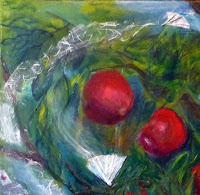My father was a man of many talents who was often challenged by the everyday frustrations of dealing with children. Fortunately for us and for him, my mother was incredibly gifted with children. I wonder sometimes if he felt a bit like an outsider among us. His world was the world of work where he was esteemed and accomplished. In that world he had an innate understanding of how to assemble teams that stayed together for their entire careers. He could paint a vision and bring others into it by the force of his confidence. But he wasn't just talk, although he did that with eloquence that won my admiration. Where did this man who grew up in poverty, the child of immigrants, learn how to weave words together, bringing people together to create something lasting? He created educational programs, buildings and a public TV station, shaping both ideas and people's lives.
I didn't see that growing up. I was a child in my own world. I remember a child's memories; spinning around in a chair at his office, stomping on the metal flooring down the middle of the old engineering lab as I listened for the echoing sound in response. I remember the smell of his pipe tobacco back when professors smoked pipes. The smell of pipe tobacco still sends me hurtling back through time.
He was impatient and driven. I imagine those qualities were somewhat tempered in a work world where he was forced to bring others along to accomplish his goals. In the world of family where he was king, we saw those qualities in their more unadulterated form, not always his finest moments. In hindsight I often recognize myself in him. I can imagine those recalcitrant children could be annoying.
Just as I ask if we ever know a parent fully, I could as easily ask if we ever know a child fully. Did he know me or just the outward manifestations? Was he locked inside a parent's eyes just as I was in a child's? My father was a problem solver and sometimes brought that perspective to his children. That was actually when he was at his best. We taught each other. He once told me that he learned he had to deal with me differently. He couldn't spank me for misbehavior and assume that would resolve it. In fact, I would turn around and do exactly the same thing again to assert that he could not control me. We had warring temperaments, perhaps too much alike. I knew how to fight back, he created me after all. He told me that he had learned he had to reason with me. I silently chuckled. I remember my thought process as a child. "Don't let him think he can control you" I had told myself.
When I went off to college in the 1970s he took me aside and tried his reasoning techniques. He began,"I know you're going to experiment with things in college", his tone calm and rational. "But I would appreciate if you didn't try acid," he continued. "Did my father just say that?" I thought. I was a "good girl" in those days, but a cautious experimenter. He understood my curiosity about the world because he shared it. I was so taken with the respectful tone of his request that I agreed to it and later when the opportunity arose, I thought back to our conversation and took a pass. I must confess to being somewhat relieved that I had promised my father.
So now I go through his career papers to sort out what I will send to the library of the university where he spent his career. I consider what aspects of this man they will be interested in even as I reflect on our college send off conversation recorded only in memory. We are complicated creatures and my father more than most. At best we only get glimpses of each other filtered through one perspective. I am grateful for this chance to see him through other perspectives as well and to acknowledge the sheer complexity of our imperfect selves.











